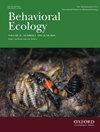Wild bumblebees use both absolute and relative evaluation when foraging
IF 2.2
3区 环境科学与生态学
Q2 BEHAVIORAL SCIENCES
引用次数: 0
Abstract
Foraging theory assumes that animals assess value based on objective payoffs; however, animals often evaluate rewards comparatively, forming expectations based on recent experience. This form of evaluation may be particularly relevant for nectar foragers such as bumblebees, where individuals can visit thousands of flowers daily that vary in nectar quality. While many animals, including bees, demonstrate reference-based evaluation in experimental contexts, it is unclear whether this occurs in the wild. Here, we asked how daily experience with wildflower nectar influenced wild bumblebees’ reward evaluation. We measured the daily nectar concentration of bee-visited wildflowers (Penstemon spp.), before presenting foragers with conspecific flowers filled with a range of artificial nectar concentrations. We recorded bees’ acceptance of artificial nectar, the probability of subsequent visits to flowers on the same plant, and residence time. While bees had a minimum threshold of nectar acceptability that was unaffected by experience, when there was higher-concentration environmental nectar, they were less likely to accept lower-quality rewards on manipulated plants. Bees also visited more flowers and stayed longer on plants with higher-concentration nectar. This study shows evidence for both absolute and reference-based evaluation in wild bees and points towards differences between bees’ behavior in lab- and wild-foraging contexts.野生熊蜂在觅食时使用绝对评价和相对评价两种方法
觅食理论认为,动物是根据客观回报来评估价值的;然而,动物通常是根据最近的经验来比较评估回报,形成期望值。这种形式的评估可能与熊蜂等采蜜者特别相关,因为熊蜂的个体每天可以采到成千上万朵花蜜,而这些花蜜的质量各不相同。虽然包括蜜蜂在内的许多动物在实验环境中都表现出了基于参照物的评价,但目前还不清楚这种情况是否发生在野外。在这里,我们想知道每天的野花花蜜经验如何影响野生熊蜂的奖赏评估。我们测量了蜜蜂每天光顾的野花(Penstemon spp.)的花蜜浓度,然后向觅食者展示了充满各种人工花蜜浓度的同种花。我们记录了蜜蜂对人工花蜜的接受程度、随后访问同一植物花朵的概率以及停留时间。虽然蜜蜂有一个不受经验影响的最低花蜜接受阈值,但当环境中的花蜜浓度较高时,它们不太可能接受操纵植物上较低质量的奖励。蜜蜂也会在花蜜浓度较高的植物上采花更多,停留时间更长。这项研究证明了野生蜜蜂的绝对评价和基于参照物的评价,并指出了蜜蜂在实验室和野生觅食环境下的行为差异。
本文章由计算机程序翻译,如有差异,请以英文原文为准。
求助全文
约1分钟内获得全文
求助全文
来源期刊

Behavioral Ecology
环境科学-动物学
CiteScore
5.20
自引率
8.30%
发文量
93
审稿时长
3.0 months
期刊介绍:
Studies on the whole range of behaving organisms, including plants, invertebrates, vertebrates, and humans, are included.
Behavioral Ecology construes the field in its broadest sense to include 1) the use of ecological and evolutionary processes to explain the occurrence and adaptive significance of behavior patterns; 2) the use of behavioral processes to predict ecological patterns, and 3) empirical, comparative analyses relating behavior to the environment in which it occurs.
 求助内容:
求助内容: 应助结果提醒方式:
应助结果提醒方式:


